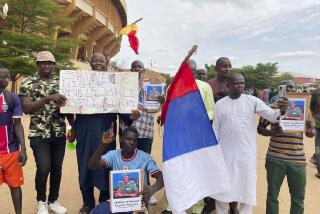Abiola, Nigeria’s Jailed Leading Dissident, Dies
NAIROBI, Kenya — Moshood Abiola, Nigeria’s most prominent political prisoner, who was widely presumed to have won a presidential election in 1993, died Tuesday of an apparent heart attack just after meeting with visiting U.S. diplomats. He was 60.
An official statement from the country’s military rulers said Abiola died at 4 p.m. after falling ill during discussions with a U.S. delegation and Nigerian officials in the West African nation’s administrative capital, Abuja. The U.S. delegation, led by Undersecretary of State Thomas R. Pickering, was the largest such mission to the country since the annulment of the 1993 vote.
The death of the man who rallied opposition to Nigeria’s military tyranny was the latest twist in the unpredictable drama of Nigerian politics, and it threatened to throw the country into further turmoil. The former business tycoon turned politician had been in detention since June 1994, when he proclaimed himself president on the basis of the 1993 vote. He was jailed and accused of treason by dictator Gen. Sani Abacha, who died of a heart attack last month.
In an interview with National Public Radio, Pickering confirmed Tuesday that Abiola, after beginning to cough and excusing himself briefly, had complained of being overheated and asked for painkillers.
A doctor was summoned, Pickering said, and ordered that Abiola immediately be taken to the hospital.
“We all helped him to go to the clinic of the president of Nigeria,” the envoy continued, “where the doctor who took him there and the other doctors worked on him for about an hour and a half, but unfortunately were unable to save him.”
“I don’t have any reason to believe that there was any sort of foul play,” Pickering said. “The doctors felt that the symptoms and the ill health and then the problem were consistent with a cardiac arrest or pulmonary embolism.” He added, however, that Nigeria planned a complete autopsy.
In Washington, President Clinton called Abiola “a distinguished citizen and patriot of Nigeria” and expressed condolences to his family and the Nigerian public.
Hopes for Abiola’s release surged after Abacha was succeeded by Gen. Abdulsalam Abubakar, who freed dozens of political detainees and vowed to restore civilian rule to the oil-rich country of more than 100 million people.
U.N. Secretary-General Kofi Annan, who last week ended a four-day visit to Nigeria, pushed for Abiola’s release and had expressed confidence that he would soon be freed.
Annan reported that Abiola had agreed to renounce his claim to the presidency and had indicated that he would cooperate with Abubakar in helping Nigeria make a peaceful transition to democracy.
In New York on Tuesday, Annan said that Abiola told him he had been held in solitary confinement. He said that Abiola had been told only that he was going to meet an important visitor and did not recognize Annan or realize that he had succeeded Boutros Boutros-Ghali as secretary-general in December 1996.
Abacha’s regime had been roundly criticized for its corruption, despotism and disregard for human rights. His plan to restore civilian rule was shunned because he was the only candidate for presidential elections set for Aug. 1. Although Abiola’s health had been failing because of years of confinement under often harsh conditions, Annan had described the politician as in good health.
Loyalists in his ethnic Yoruba heartland in Nigeria’s southwest, who are eager to see northern political dominance ended, refused to accept that Abiola had surrendered his chance to become the first elected president in a decade of Africa’s most populous nation.
His supporters’ pledge to continue campaigning for the validation of the annulled presidential vote had spurred the government to delay Abiola’s release, citing security concerns.
News of Abiola’s death was met with sadness and disbelief. There also were reports of scattered rioting in Lagos, Nigeria’s main city.
“We are very shocked--it’s tears all over the place,” said Anyakwee S. Nsirimovu, executive director of the Institute of Human Rights and Humanitarian Law in the Niger Delta river town of Port Harcourt. “There is no way that the government can convince any Nigerian that Abiola died of cardiac arrest. We think [he] has been murdered by this new government. They had the opportunity to release him all along, but they did not.”
In an interview with CNN on Tuesday, Abiola’s daughter Hafsat also charged that the military regime was responsible for her father’s death.
She said it was caused by “either medical neglect or poison. In either case, the military is responsible. . . . It was too convenient. All of a sudden, at the eve of his release, he dies.”
She offered no evidence of foul play beyond asserting that her father had been mistreated in prison. But Abiola did reportedly suffer from high blood pressure, circulatory problems and possibly diabetes, as the chairman of the U.S. group Physicians for Human Rights noted last month in appealing to Abubakar for his release.
Abiola’s case was the most difficult for the country’s new regime, in terms of winning credibility for any plan to restore civilian rule. “That has been a thorn in the flesh of this government,” Nsirimovu said. “We have just concluded that the government has a hidden agenda to continue military rule in this country. They even stage-managed [Abiola’s death] so they would have an American witness his illness.”
The man whose full name was Moshood Kashimawo Olawale Abiola was born in 1937 to a poor family in southwest Nigeria and claimed to be his parents’ 23rd child and the first to survive. In fact, his name meant: “Let us watch whether this one too will die.”
Abiola sometimes moonlighted as a singer to earn money to pay for his early education but eventually graduated on a scholarship from the University of Glasgow in Scotland with a degree in economics.
His business acumen soon became apparent and, from 1969 to 1988, he served as an executive with International Telephone & Telegraph Corp., including as overseer of its African and Middle Eastern operations. He went on to build an empire that stretched from publishing, shipping and oil to the airline industry.
Abiola’s enthusiasm as a pan-Africanist, lobbying Western nations for compensation for Africans for slavery and colonialism, won him international acclaim and contacts who would later back him in his fight against the government.
He first gained the political limelight with his 1993 bid for the presidency on Nigeria’s now-defunct Social Democratic Party ticket after his once good friend and former Nigerian President Ibrahim Babangida banned 23 other presidential hopefuls.
His popularity at home was bolstered by his deep respect for African culture, music and literature.
But during his detention, the former multimillionaire’s financial and personal life suffered. The business interests that had made him one of Africa’s richest men slowly began to crumble.
Though he is survived by scores of children and dozens of wives, two of his partners died during his detention. One, his senior wife, Kudirat, who had strongly campaigned for his release, was assassinated in 1996 by unknown gunmen in Lagos.
Nongovernmental observers in Washington said Abiola’s death may make it easier for Nigeria’s new regime to stage elections that could clear the way for civilian government, because the government will not have to deal with Abiola’s claim to have already won the presidency. With Abiola on the scene, any new election might have appeared tainted.
But many Nigerians are skeptical that the blatant gangsterism that cost Abiola’s wife her life will end under Abubakar, and many doubt that the government will quickly usher Nigeria into a golden era.
“We are back to square one, where we were with Abacha,” said Nsirimovu, the human rights activist. “There is going to be tension. There is going to be violence in this place.”
Times staff writers Norman Kempster in Washington and Craig Turner at the United Nations contributed to this report.
More to Read
Sign up for Essential California
The most important California stories and recommendations in your inbox every morning.
You may occasionally receive promotional content from the Los Angeles Times.











